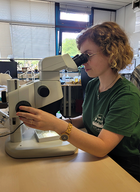The research training group is open to all doctoral candidates at the University of Hohenheim working towards a Dr. rer. nat. or Dr. sc. agr. degree whose research work is thematically appropriate.
Doctoral students in the research training group study in accordance with the doctoral regulations of the Faculty of Natural Sciences at the University of Hohenheim. Each doctoral student is guided by at least two to three supervisors from the University of Hohenheim and/or the Natural History Museum Stuttgart in planning and carrying out their research work.
The central part of the education begins with the preparation of a research exposé, which helps the candidates to structure and focus their work from the outset.
Optimal conditions are also provided for further researching beyond one's own research work. To this end, doctoral candidats have access to a comprehensive range of events and courses for acquiring key qualifications.
The establishment of summer schools and workshops planned with Europe-wide partners will provide doctoral students with additional excellent opportunities for further training and networking.
General information on starting a doctorate study program at the University of Hohenheim can be found at the Graduate Academy of the University of Hohenheim.
All enrolled doctoral students whose research topic falls within the research field of the research training group “Biodiversity through times” can apply to the Faculty of Natural Sciences for admission to the doctoral program. Admission is possible at any time.
Outstanding students of the Faculty of Natural Sciences are eligible for annual funding by the Graduate Funding Scheme of the State of Baden-Württemberg.
The Graduate Academy will inform you about further funding opportunities.




